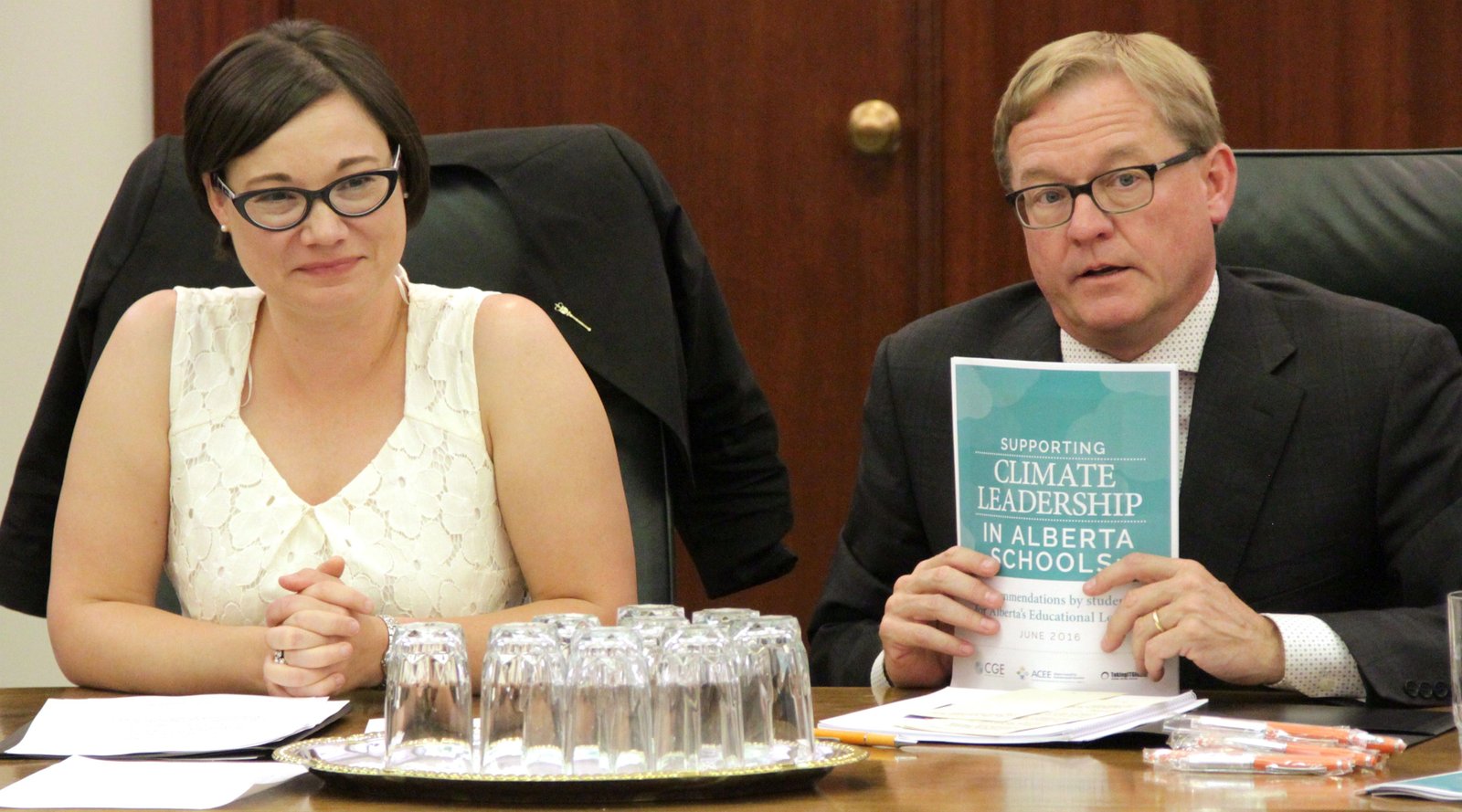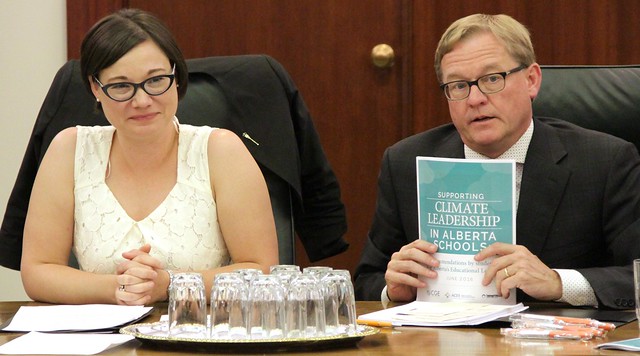By David Dodge & Dylan Thompson
You may remember the students from the Centre for Global Education program. We told you about the white paper on climate change policy in Alberta they wrote and presented to Premier Rachel Notley well before the provincial NDP announced Alberta’s Climate Leadership plan last November.
Premier Notley was so taken with these students she went back to meet with them at another virtual town hall meeting when the Alberta team of students started researching and writing a follow-up white paper on climate change action in Alberta schools.
The new white paper recommends infusing climate change into the curriculum, new strategies for student learning, making school infrastructure sustainable and funding climate leadership projects in schools.Green Energy Futures went to that student town hall meeting and now the students have finished their paper Climate Leadership in Alberta Schools. These intrepid students were then invited to present the paper to the Hon. Shannon Phillips, Minister of Environment and Parks and Hon. David Eggen, Minister of Education for Alberta.
Students want climate change in the curriculum
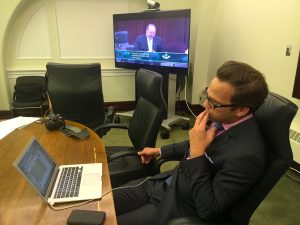
Terry Godwaldt of the student Global Connect program listens to Alberta students as they prepare for a meeting with Alberta’s ministers of education and environment in the Alberta Legislature. Bill 20, the Climate Implementation Act passed just moments after this photo was taken.
Photo David Dodge, GreenEnergyFutures.ca See video, blog and photos: https://www.greenenergyfutures.ca/episode/150-students-meet-ministers
“We engaged the opinions and the passion of over 3,000 students,” says Gareth Thomson, of the Alberta Council for Environmental Education, who acted as a resource to the student-led project. “We had 45 student leaders who spent time every week hanging out together, learning together. We had 2,200 students who responded to a survey that was sent out by the student leaders in eight high schools, both urban and rural across Alberta. It was a tour de force.”
On June 7, a delegation of students took their white paper to the Alberta Legislature to meet with the ministers, just minutes after Bill 20, the Climate Leadership Implementation Act was passed in the Alberta Legislature.
Grade 11 student Stephanie Zuwaduk calls climate change “The defining issue of our generation.”
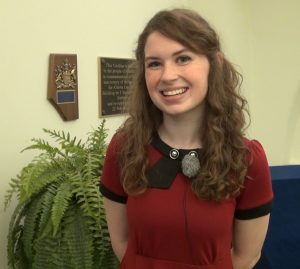
Climate Change is “The defining issue of our generation..climate change is an immediate reality for us.” That’s how Stephanie Zuwaduk opened her presentation to the Alberta ministers of education and environment. Photo David Dodge, GreenEnergyFutures.ca
“We understand that climate change can be intimidating and overwhelming. But we believe that the antidote to despair is action. We must not stand idle and wait for someone else to initiate change. We must initiate change as the youth and as Albertans so that we have a brighter future in the wake of climate change,” Zuwaduk told the ministers.
Students from Fort McMurray, Bonneyville and Edmonton came to meet the ministers and present their ideas for how to take action on climate change by creating new curriculum and taking action right in schools.
The students did their own research, they invited resource experts to give presentations and then a delegation of 10 students locked themselves in a room for a weekend with some graduate students from the University of Alberta to boil inputs from 3,000 students down into a sophisticated set of recommendations for change.
Mudassar Javid, a grade 11 student from Queen Elizabeth High School, told the ministers they want initiatives to reduce the carbon footprint of students and schools. They want more learning to happen outside in the environment and they want to work with community leaders—to learn how to address the real-world issue of climate change.
Javid also said students want “equality of voice” a place on advisory committees in schools, at school boards and in the provincial government to ensure their voice is heard.
Students want schools to become models of sustainability
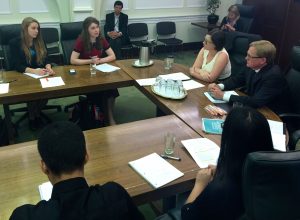
“We must be prepared to deal with climate change and everything it brings in the future. We understand that climate change can be intimidating and overwhelming. But we believe that the antidote to despair is action. We must not stand idle and wait for someone else to initiate change,” said Stephani Zuwaduk, a grade 11 student from Queen Elizabeth High School. Photo David Dodge, GreenEnergyFutures.ca
“We don’t want small-scale change,” said Leah Buchannan, another grade 11 student, to ministers Phillips and Eggen. “We’re looking for Alberta-wide change. We’re looking for solar panels on the roof of every school. We’re looking for students who are being inspired by their teachers like we are. We can only achieve these things with your help.”
For Helen Wang, a student from Westwood High School in Fort McMurray, climate change is even more important in the wake of the devastating wildfires that ripped through her home city.
“Well, I think more strongly of those issues now with the recent events that’s happened,” said Wang. “Again those events that are likely a result of the changing climate because this spring has been the driest and the hottest and the most sudden of all springs. That really hits the point closer to home. It gives additional motivation to make a difference.”
She says integrating climate change into schools and the curriculum means “Students will be learning about climate change and how to prevent it through all subjects every year.”
So what does the future look like if the students are successful?
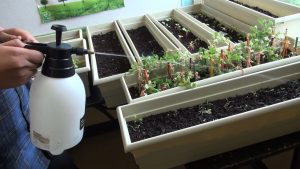
Students at Queen Elizabeth High School are growing plants in their classroom. Students said that they’ve learned that studies have shown that having plants helps increase concentration – and they seem to enjoy learning about growing things too. Photo David Dodge, GreenEnergyFutures.ca
“There will be fewer people denying climate change,” said Wang. “There will be more awareness. There will be more activity done to address this issue. Of course, there will be physical changes like solar panels on the roofs, wind turbines and more renewable methods of energy.”
In this weird new world, you might expect government ministers to cringe at the thought of being lobbied by a group of idealistic students, but the Hon. David Eggen, minister of education thanked the students for their hard work and said: “We’re looking for ways to reduce our carbon footprint in Alberta and we’re also looking for ways to diversity our economy.”
Shannon Phillips, the minister of environment, parks and climate change, who had just passed Bill 20, The Climate Change Leadership Implementation Act, told the students: “The act that we just passed is the architecture, now we move the furniture in. Initiatives like yours are exactly the kinds of partnerships we want to explore moving forward.”
“That’s the thing that people leave out of this conversation, how ready Albertans are to move this province forward,” said Phillips. “We see it with folks like you, with solar co-ops, with dairy farmers in rural areas. People are doing these fantastic initiatives with no support whatsoever! Imagine what we can do now that we have the ability to reinvest a price on carbon into these initiatives.”
Many of the students confirmed their deep pessimism when they started their climate leadership project, but as Helen Wang from Fort McMurray says: “I’m feeling far more optimistic than I was. Meeting with the leaders … really, really helps with the optimism.”
Alberta has its Climate Leadership Implementation Act, it has even committed $3.4 billion to phasing out coal plants and building enough renewable energy for Alberta to get 30 per cent of its electricity from clean sources by 2030. The proof will be in the pudding as they say, but it seems like the students have a powerful starting point for ensuring schools are models of sustainability and that students are equipped to deal with the real world challenges that will shape our future.
